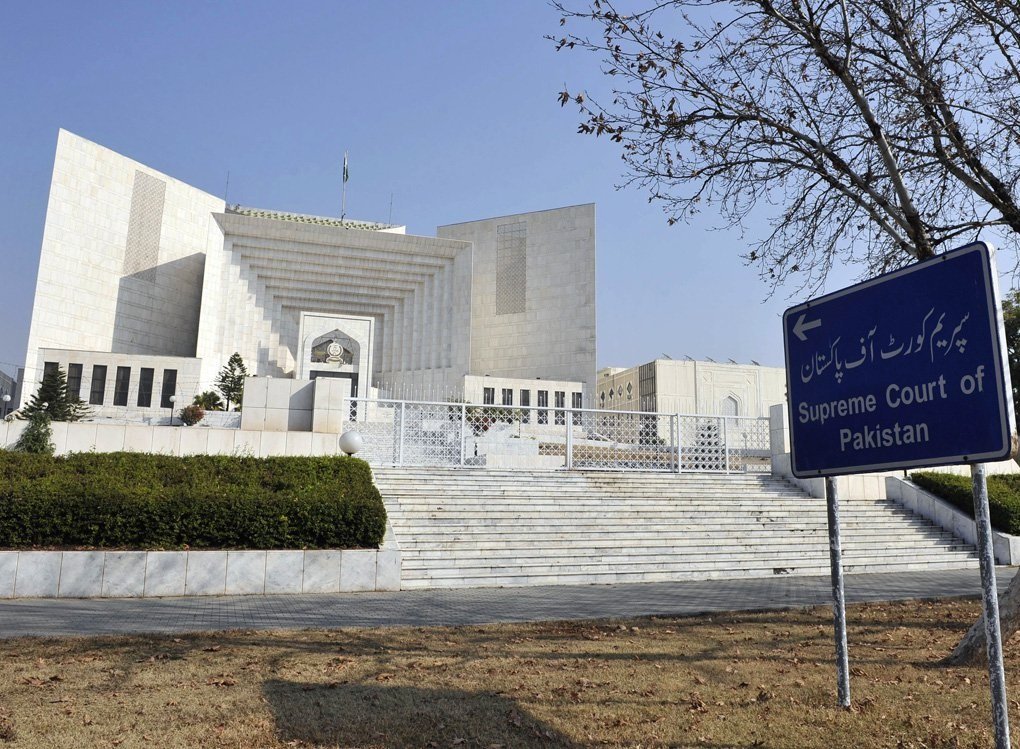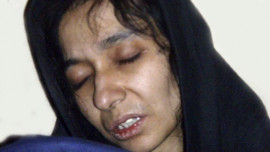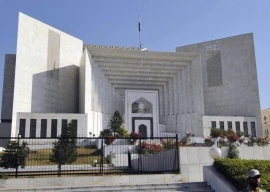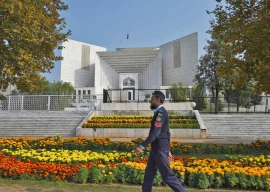
The Supreme Court has expressed wonder over the amendment in National Accountability Ordinance (NAO) 1999 which aims at undoing all plea bargains earlier entered into between the National Accountability Bureau (NAB) and the accused.
A three-judge special bench of the apex court headed by Chief Justice of Pakistan Umar Ata Bandial expressed astonishment during the hearing of PTI Chairman and former premier Imran Khan’s petition on Wednesday against recent amendments in NAO.
This was the seventh hearing of the case wherein Imran’s counsel Khawaja Haris continued to advance his arguments in the case.
The PTI chief in his petition had claimed that the amendments to the NAB law were made to benefit the influential accused persons and legitimise corruption.
The applicant had also challenged the second amendment to the law done by the government in which offences involving misappropriation of less than Rs500 million were taken out of the purview of the law.
During the hearing, the bench wondered as to how the amount deposited with the NAB would be reimbursed to the accused after the admission of guilt and entering a plea bargain.
Justice Ijazul Ahsan, a member of the bench, observed that the Supreme Court found that parliament’s supremacy was not unbridled but was subject to the Constitution, adding that accountability was one of the main principles in Islam and “if you take it out then you are discharging trust”.
PTI senior leaders Chaudhry Fawad Hussain, Senator Azam Swati and Maleeka Bukhari were present in the courtroom. The lawmakers prepared notes for media talk as they did during the hearing of Panamagate proceedings in the apex court.
It has been witnessed that since the Panama case, PTI's media policy is linked with the legal strategy and that the party had been successful to get favourable results.
During the hearing, counsel Haris focused on the amendment related to plea bargain while referring to the amendment in section 25b of NAO 1999.
Amendment in section 25b of NAO 1999 states that where an accused challenges the validity of order approving plea bargain or it comes to the knowledge of the court otherwise that the plea bargain was a result of duress, coercion or any other illegal pressure exerted on the accused during the course of inquiry or investigation, the court after hearing both the parties may recall the approval of plea bargain to the extent of that accused.
The counsel submitted that the amendment aimed at undoing all the plea bargains earlier entered into between the NAB and the accused, notwithstanding that such plea bargains were entered into after obtaining approval of court, and such approval was granted after hearing all the parties concerned.
“Thus the amendment is just a ruse to undo already concluded plea bargains, irrespective of whether these have been fully acted upon or not.”
The counsel further argued that the objective of the amendment appeared to undo the statements of all such accused who, after entering into plea bargain, had further become witnesses against the principal accused, and their testimony as such could be used against the principal accused.
“In some cases it may be designed to undo is also directed towards undoing all such plea bargains with a view to get such plea bargaining accused exonerated of the charges against them and to provide them an opportunity and facilitate them to claim back even that money which they had earlier deposited with NAB as a condition precedent for their release; and evidently this will lead to causing loss to the national exchequer as such money is meant to be and would have since been deposited with the appropriate government.”
CJP Bandial noted that this way the state would have to pay billions of rupees to the accused.
Justice Syed Mansoor Ali Shah, another member of the bench, however, asked if taking money from the accused under pressure was correct.
He again asked the counsel why the petitioner (Imran Khan) did not raise the objections on these amendments in parliament. He wondered how the PTI chairman could walk out of the parliament without the wish of his constituency, wherein he was elected as MNA.
Justice Shah again said that the former premier could have raised these objections on amendments in the parliament.
Justice Ahsan while endorsing the petitioner concerns wondered whether those who had entered the plea bargain in the scams of below Rs500 million would approach the court for recovery as their cases did not fall in the NAB jurisdiction after new amendments.
The bench also noted that the recent amendments had decriminalise certain offences.
Counsel Haris said that concessions to the accused through these amendments were violative of Article 9 of the Constitution.
The CJP asked which concessions would be violative of the fundamental rights.
The hearing of case is adjourned till Thursday (today).
A government member revealed that concerns regarding these amendments were based on speculations as government attorney Makhdoom Ali Khan would strongly defend these amendments.
Meanwhile, the NAB submitted a written statement with the Supreme Court saying it would adopt submissions made by and on behalf of the federal government except any adverse statements and arguments advanced against it (NAB) in writing or oral.
The statement was submitted by Acting Additional Prosecutor General Chaudhry Mumtaz Yousuf.








1732356840-0/Copy-of-Untitled-(1)1732356840-0-270x192.webp)












COMMENTS (6)
Comments are moderated and generally will be posted if they are on-topic and not abusive.
For more information, please see our Comments FAQ